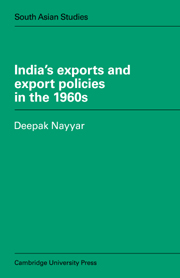Book contents
- Frontmatter
- Contents
- List of tables
- Preface
- Abbreviations
- A note on statistical tables
- Introduction
- PART ONE GENERAL
- PART TWO EMPIRICAL ANALYSIS: A MICRO APPROACH
- PART THREE POLICY ANALYSIS: A MACRO ECONOMIC VIEW
- 10 Export policies in the 1960s
- 11 The impact of devaluation
- 12 Bilateral rupee trade and export growth
- 13 Concluding observations
- 14 Postscript – the early 1970s
- Select bibliography
- Index
10 - Export policies in the 1960s
from PART THREE - POLICY ANALYSIS: A MACRO ECONOMIC VIEW
Published online by Cambridge University Press: 03 May 2010
- Frontmatter
- Contents
- List of tables
- Preface
- Abbreviations
- A note on statistical tables
- Introduction
- PART ONE GENERAL
- PART TWO EMPIRICAL ANALYSIS: A MICRO APPROACH
- PART THREE POLICY ANALYSIS: A MACRO ECONOMIC VIEW
- 10 Export policies in the 1960s
- 11 The impact of devaluation
- 12 Bilateral rupee trade and export growth
- 13 Concluding observations
- 14 Postscript – the early 1970s
- Select bibliography
- Index
Summary
So far, we have been concerned mainly with an examination of the factors underlying the trends in India's exports from 1960 to 1970. In the last seven chapters, we made an attempt to analyse India's export performance in her major traditional and non-traditional exports, which, taken together, accounted for more than 60 per cent of the total export earnings during the 1960s. Given the diverse commodity composition, this micro approach was clearly essential, and we did find that the factors and policies affecting export trends varied considerably as between products. However, meaningful policy prescriptions must be based not only on lessons drawn from the export problems of individual commodities, but also on an evaluation of factors that influenced exports as a whole. Therefore, the following chapters, which are devoted to an analysis of policy, focus attention on the macro economic aspects of the problem.
This particular chapter considers the domestic policies towards exportables, except for the 1966 devaluation of the rupee, which is discussed in the next chapter. Thereafter, we go on to consider the effects of the policy of bilateral trade agreements on export growth.
It is striking that during the period under study, Indian export policy went through numerous modifications and reformulations. But all these changes did have the common objective of promoting export growth. The efforts at export promotion provided a sharp contrast with the pessimistic neglect of exports in the 1950s.
- Type
- Chapter
- Information
- India's Exports and Export Policies in the 1960's , pp. 219 - 266Publisher: Cambridge University PressPrint publication year: 1977
- 1
- Cited by

